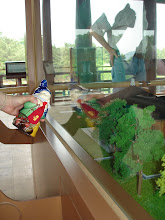| From left to right: Dr. Alex Konopelko, Brandon Wolak, Melissa Churning, David Heins, Stephanie Powers, Allen Fluck, Stevynn Cutshall, Aaron Flood, Josh Silvers, Katie Whitbeck |
Pittsburg State students of physics had a rare opportunity to visit the Max Plank Institutes of Astronomy and Nuclear Physics this summer on a trip led by Dr. Alex Konopelko.
Konopelko, who is an assistant professor of the physics, took nine students to Heidelberg, Germany, in August for a behind the scenes look the famous institutes. Dr. Konopelko applied for and received support for the program from DAAD —the German Academic Exchange Service—an organization akin to the Fulbright Program in the United States. DAAD awarded PSU a “Group Study Visit Grant” which covered virtually all the on-the-ground costs for a group of students to spend 10 days on the faculty –led academic program in Germany.
“Heidelberg University is one of the top-ranking institutions in the world of international science and scholarship,” says Konopelko. “With its six-hundred-year history, it is Germany's oldest seat of higher learning.”
The visit provied a wide variety of opportunities for advanced learning that perfectly complements the physics curriculum at PSU. The group of physics students traveling to Heidelberg in summer, 2011 took a Study Abroad course entitled Introduction to Modern Astrophysics. The goal of this course is to introduce students who have a serious interest in the physical sciences to the breadth of modern Astrophysics and prepare them for more advanced topical courses in the future.
“The Department of Physics and Astronomy of Heidelberg University was very kind to agreed to serve as a host for the group,” says Konopelko. “Stefan Wagner was willing to help this group with local arrangements.”
The group of physics students from PSU will visited the Max-Planck-Institute for Nuclear Physics (MPI-K), Heidelberg, which is leading a large-scale European project in Astrophysics, which is called CTA.
“Werner Hofmann, who is one of the directors of this institute and spokesperson for CTA, supervised the classes at the MPI-K. Professors Wagner and Hofmann lectured to our students.” Says Konopelko. “In addition, a number of other professors of Heidelberg University also gave lectures in the Modern Astrophysics course. Among them are Wolfgang Kraetschmer, who together with Donald Huffman from the University of Arizona developed the world famous Kraetschmer-Huffman procedure for the synthesis of fullerenes, and Oxford-educated John Kirk, who is one of the best theoretical astrophysicists in the world.”
In addition to the opportunities in physics, foreign travel also opened educational doors for our students.
“I had never really had Germany on my list of places I wanted to visit,” says Katie Whitbeck, who is a Communication major and an Earth and Space Science minor, “but I constantly checked the study abroad listings for a good, yet cheap, trip, and the Germany trip was perfect! It fit perfectly with what I was interested in.
“Before this trip, I had only gone to Canada, and I didn't know any of the other students, but we became a tight group quickly. I enjoyed every moment and adventure over there.”
“I got a better understanding of the German culture,” says Melissa Churning, who has a double major in French and Mechanical Technology. “The culture is much different than from ours. I learned to adapt to unusual surroundings. I also learned how to understand some of the German language by reading the street signs and food menus; I learned to adapt to living with strangers in a youth hostel.”
From : Universitas, the online newsletter from Pittsburg State University College of Arts and Sciences


No comments:
Post a Comment